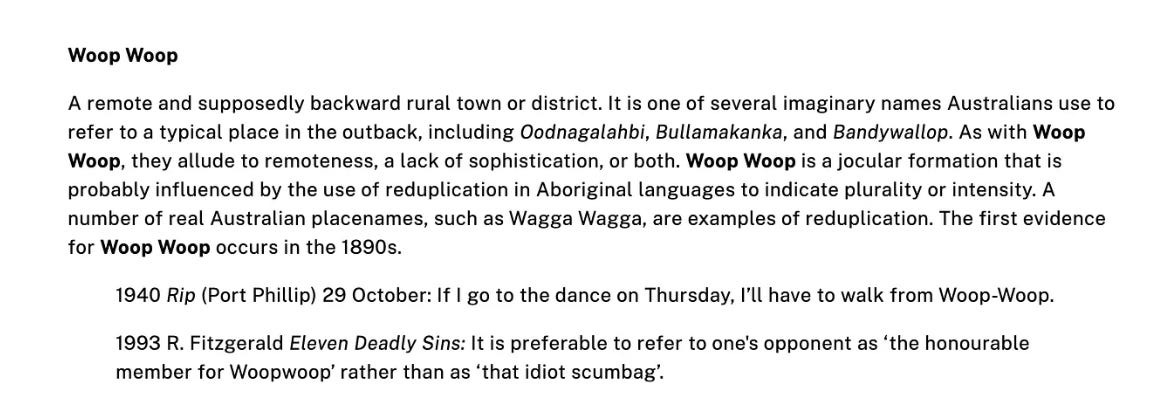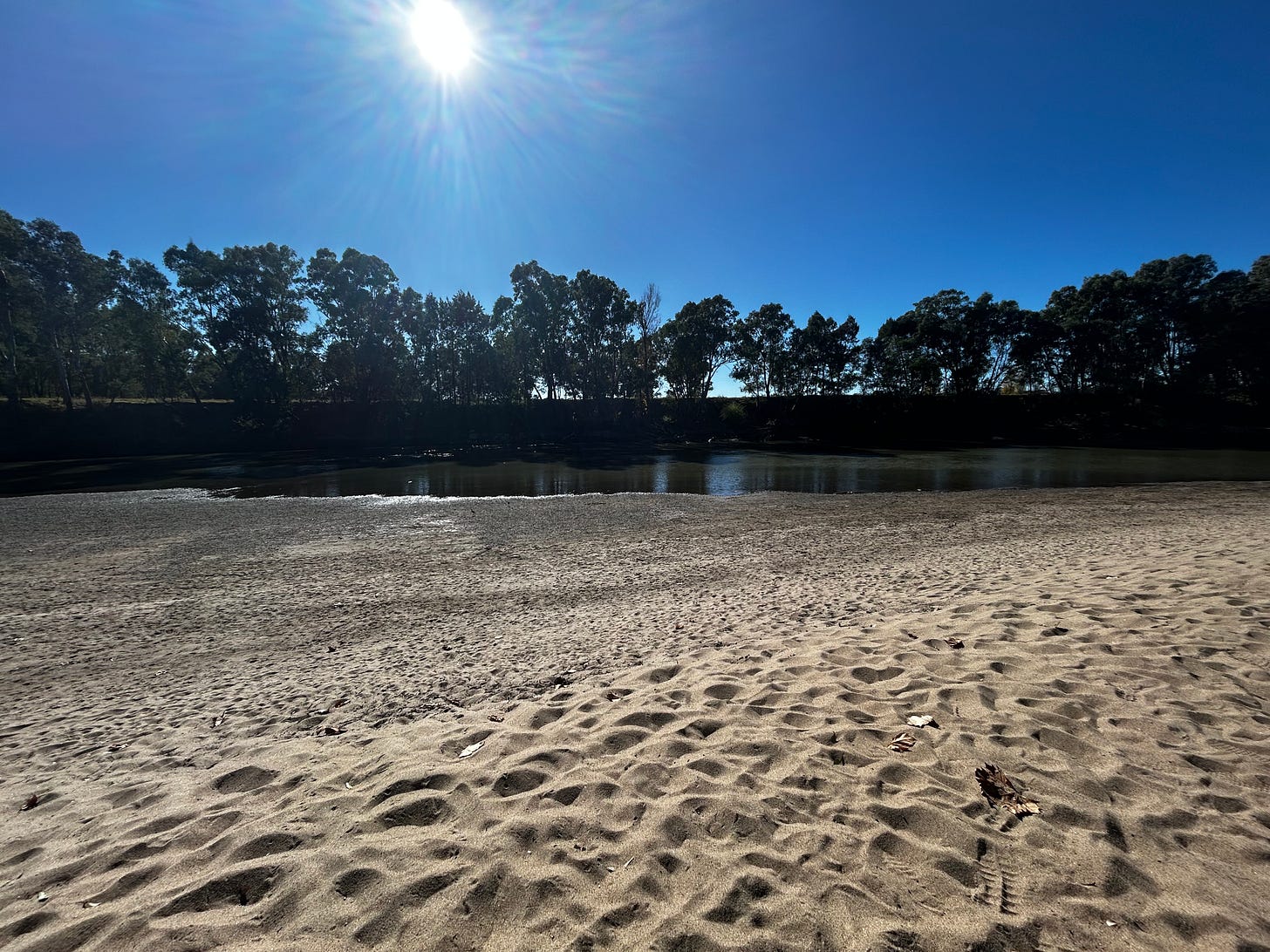From Woop Woop to Woop Woop
Because every place is someone’s world
The Flyways
A few weeks ago, it was 6am on Riverside Drive in Wooli, six and a half hours north of Sydney.
A few weeks later, same time, Victoria Street in Taree on the Mid North Coast. The things we do for our kids’ sport.
One benefit of all this travelling is that I’m slowly learning the map of New South Wales.
Turns out there’s life beyond the 50-kilometre comfort zone of any metro postcode.
The Etymology of Distance
Bourke is a town in the north-west of New South Wales. Approximately 700km from Sydney.
Yet sitting here at 6am in Grafton, I realise how arbitrary these measurements are.
The Australian idiom woop woop first appeared in print in the 1890s. It’s a playful way to refer to a real or imaginary outback town—so insignificant and remote that it seems to fall off the map entirely. But if I were from one of those towns, I’d probably find it mocking.
I’m no etymologist, but mockery has its origins too.
The term woop woop is believed to borrow its structure from First Nations languages, where reduplication often conveys plurality or intensity.
Think: Wagga Wagga, Curl Curl, Woy Woy, Bong Bong, Goonoo Goonoo… the list goes on.
Wikipedia claims the term originated in the shearer’s shed, mimicking the call of men running with fleeces — “woop‑woop” echoing in the air.
Meanwhile the Oxford Reference Dictionary suggests it satirises Aboriginal-style place name, typical of late 19th-century humour.
Almost two decades ago, when I first heard someone say Back o’ Bourke, I assumed Bourke was a person and Back was his son. Possibly Irish, I thought.
Turns out it’s one of the most recognisable idioms in Australian vocabulary. Back o’Bourke means: middle of nowhere.
But unlike woop woop, back o’Bourke had a more direct lineage. Bourke was one of the first white settlements at the edges of settlement itself.
A symbol of a vast and remote interior. A synonym of sorts. For isolation.
I was ignorant not to know what these terms meant. You can’t fault someone for making sense of the unfamiliar, through familiar patterns.
Sometimes, humour becomes part of that pattern. But humour can sting. It can be dismissive.
When my parents moved to the South-West of Sydney, they moved to a then sleepy suburb called Minto. My friends would joke they had to travel to woop woop just to visit. We’d laugh, but under the cackle was a quieter truth: we couldn’t afford a home in the eastern suburbs where we first arrived.
So we moved to…

Flight Paths
The Bar-tailed Godwit doesn't apologise for the distance.
It’s the bird that holds the record for the longest non-stop flight of any species—eleven days straight, from Alaska to New Zealand. No landing. No eating. No sleep.
It fuels up on marine worms and shellfish before departure, then launches into what seems like a most remarkable feat. No yoyo tests. No google maps. Just instinct.
A certainty that the journey leads to somewhere worth landing. It is commitment. It is survival.
Our sporting weekends aren’t quite survival. But the endurance required sometimes feels Godwit-like. We are not flying past typhoons or over vast oceans. But it does beg a serious kind of energy.
Late Thursday afternoon departures, dictated by early Friday game schedules. The tyranny of regional sport. You learn to read the NSW map by the schedule of the season.
I am not complaining. These are just observations.
A decade ago I may have still believed Bourke was someone’s dad. I hadn’t yet learnt the flyways.
Birds that never migrate develop a particular kind of ignorance. They mistake their inherited territory for the entire world. Their familiar calls become the only legitimate sounds.
We do the same. When forced to acknowledge another place exists, we dismiss it with a casual cruelty:
“Do you need a passport to get to Minto?”
But migration teaches you things that staying put never could. That café with the best coffee six hours north of home. That tiny bookstore eight hours west, opened in a grandmother’s garage.
That Tottenham in NSW has nothing to do with soccer. It is the geographical center of the state of NSW.
It is the people in these places that create the stories that make our history.
That a place isn’t valuable because it’s close. It is valuable because of its people that choose to live there.
My parents were like Godwits. They had found ground where they could land their feet.
We were home in woop woop.
The Grafton Conversation
Two men lean against a fence, steam curling from their takeaway cups.
"I mean, honestly," says the father from Killarney Heights, adjusting his Patagonia jacket, "why do they organise this here? It is so hard to find accommodation."
The father from Parkes nods. "yep”
Killarney dad takes a sip from his keep cup.
Parkes dad shrugs, still tapping his soiled right boot. “Left at 4am yesterday to make the first game.”
I’m standing close enough to hear them, refreshing the tournament draw on my phone.
Maybe just in that moment neither realises that Killarney to Grafton is a six-and-a-half-hour drive up the Pacific Highway.
Parkes to Grafton is nine hours across the state. Country roads, tiny towns.
They are both convinced they have made the ultimate sacrifice. Each certain they’ve driven to woop woop.
Because Woop woop is always somewhere else. Until you’re standing in it.
Double Meaning
In spirit and use, phrases like woop woop and back o’ Bourke do more than just describe distance. They hide a mostly metropolitan view of remoteness as irrelevance.
Woop Woop and back o’ Bourke may have originated as geographic descriptors or symbols of language. But they became dismissive labels. Wielded like a child would a kitchen knife. A casual way of rendering the other, invisible or laughable.
I came across a poem by Lola Gornall, published in The Bulletin in 1920, that offers a stern push back to that way of thinking. She writes:
“Condemned for life to a wooden stool, /
The city, not Woop-Woop is the fool.”
Her vision of woop woop is affectionate. It is vivid.
Not a vastly empty scrubland, but a landscape alive with cicadas, parrots, and silver-grey kangaroos. The smell of Eucalypts hanging in the air. The moon shimmering in a sky that is frosty.
It is a quiet but deliberate rebuttal to the casual snobbery often disguised as humour.
In this way, woop woop holds a double life: part playful language, part cultural attitudes.
It reflects our impulse, a metropolitan one at that, to map distance as irrelevance. But it also teaches us that life in the back of beyond is full. And rich
The Lotto
Next weekend there'll be another 6am start. Another country town, another street name to type into google maps and an airbnb to settle into.
The schedule arrives. Tamworth wins the lotto this time.
That familiar ritual of checking accommodation, calculating drive time, what day to leave and how to manage this around work schedules.
But now I understand what I am really doing on these drives.
I am learning to read the country not by algorithm, but by its people and their stories.
The story of the woman who runs the bakery on a sleepy street outside the main town doesn't usually open at 5AM. But she knows the traveling teams will need coffee and something decent to eat.
The fact that the sausage sizzle and coffee at the canteen is going to fund a turf that was destroyed by unprecedented floods. They promised it was a one-in-a-hundred-year event. But those odds have been beaten: three times in the last five years.
These sporting trips are voluntary journeys that are a serendipitous education in geography. Empathy.
The godwit doesn't question its route. It simply follows that inner drive towards somewhere it knows it needs to be.
Meanwhile I'm still learning the flyways. I am discovering that every place is someone's world. But it is also someone else’s fringe.
Grafton at 6am on a Saturday morning is exactly where I needed to be but also foreign.
It wasn’t Tamworth that won the lotto.
It was us.
![[unsent] notes](https://substackcdn.com/image/fetch/$s_!RZJ9!,w_80,h_80,c_fill,f_auto,q_auto:good,fl_progressive:steep,g_auto/https%3A%2F%2Fsubstack-post-media.s3.amazonaws.com%2Fpublic%2Fimages%2Fbfab2774-1049-486e-a529-14d406462092_500x500.png)
![[unsent] notes](https://substackcdn.com/image/fetch/$s_!7BYw!,e_trim:10:white/e_trim:10:transparent/h_72,c_limit,f_auto,q_auto:good,fl_progressive:steep/https%3A%2F%2Fsubstack-post-media.s3.amazonaws.com%2Fpublic%2Fimages%2F4427d885-8ab7-469b-b968-382b0c655402_1400x300.png)



Insecurity is the fertile soil that nurtures mockery. There's a Latin term and a debating technique, reductio ad absurdum; prove one's point by making the other seem ridiculous. Mock someone to cover up our own insecurity and reduce that person to a state of insecurity and so on, ad nauseum. (that's about all the Latin I know).
Every place is someone’s world, how true and meaningful. One gets to understand this when one travels especially outside their comfort zone.
We got a glimpse of this when we drove through various places in Australia between different cities and States. It is amazing and humbling to see how people live in places where the facilities are primitive and the resilience they develop in order to survive.